The repertorium of Parisian arts masters and their readings naturally lead me to the contents of these texts. More than the doctrinal contents, it was the way in which these texts were connected to the actual teaching in the schools that interested me. How did the masters teach their disciplines, with which methods and tools, how did the students assimilate the knowledge and prove they had sufficiently integrated all the information? And what was the relation between the written records that came down to us and the day to day reality? This kind of questions were rarely addressed, since most scholars concentrated either on institutional history or on doctrinal developments. It seemed to me that here was a field of study that deserved attention: the intellectual history of the early universities.
Thus, the theme I chose to lecture upon when I was invited to give a seminar for one year at the Ecole Pratique des Hautes Etudes, was intellectual practices at the early universities. The publication resulting from this is called Le maniement du savoir. Pratiques intellectuelles à l’époque des premières universités; it was published in 1996 (see List of publications, book 10). The term “maniement” aptly describes what I meant to describe: how the masters and students handled all the new knowledge that became available to them in a relatively short period, which were the tools they developed to understand, comment and teach the disciplines that became the basis of the curriculum (Priscian, Porphyry, Aristotle and others), and in which context the teaching and learning took place. The book contains fourteen chapters:
Cliquez sur les images pour les agrandir
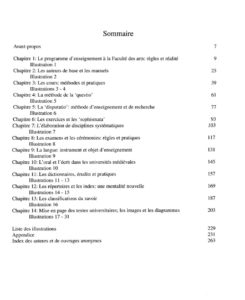
From programmes of teaching and basic authors, via methods of teaching (especially lectio, questio and disputatio), examinations and ceremonies, to the role of language, the relationship between oral and written, tools like dictionaries and repertoria, the classification of sciences and the layout of university texts, my aim was to present a more or less complete picture of what was happening in the faculty of arts of the university of Paris during the first century of its existence.
Many years later, in 2015, I recycled and completed the materials of this publication in a smaller book, meant for a larger public: A Scholar’s Paradise. Teaching and Debating in Medieval Paris (see List of publications, book 23).
A Scholar’s Paradise. Teaching and Debating in Medieval Paris
Apart from resuming and reorganising the main subjects of the earlier study, I made this book begin with a chapter describing the city in which the university resided, and at the end I added two new chapters, one on the various interdictions of ‘dangerous’ learning, the other offering an example of one of the more famous Parisian sholars and his career.
If the smaller book is more accessible and entertaining, while at the same time somewhat wider in its range, this was made possible because in the meantime I had continued my research in the field, as shown by a number of articles and editions of collective volumes.
Collective Volumes
Among the collective volumes, n° 3, 5 and 6 combine my interest in vocabulary and teaching methods. Here are the tables of contents:
N° 3 Méthodes et instruments du travail intellectuel au moyen âge (1990)
N° 5: Vocabulaire des écoles et des méthodes d’enseignement au moyen âge (1992)
N° 6: Vocabulary of Teaching and Research Between Middle Ages and Renaissance (1995)
Other collective volumes, the proceedings of two colloquia, concern institutional history as well as methods and contents of teaching:
n° 7 L’enseignement des disciplines à la Faculté des arts (Paris et Oxford, XIIIe-XVe s.), in collaboration with Louis Holtz, published in 1997 (see above Part III, 1 for the table of contents).
n° 12 Les débuts de l’enseignement universitaire à Paris (1200 – 1245 environ), in collaboration with Jacques Verger, published in 2013. Here is the table of contents:
Table des matières
Avant-propos
Introduction
Section I : Le contexte
John Baldwin, Le contexte politique et institutionnel
Jacques Verger, Que sait-on des institutions universitaires parisiennes avant 1245 ?
Nathalie Gorochov, Le milieu universitaire à Paris dans la première moitié du XIIIe siècle
Section II : Grammaire et logique
Anne Grondeux, Le trivium à la faculté des arts de Paris avant 1245. Quelques questions méthodologiques
Sten Ebbesen, Logical Texts. 12th or 13th Century? Paris or Elsewhere?
Christopher Lucken, La « Biblionomia » de Richard de Fournival : un programme d’enseignement par le livre. Le cas du trivium
Section III : Philosophie
Ruedi Imbach, Introduction
Luca Bianchi, Couper, distinguer, compléter : trois stratégies de lecture d’Aristote à la Faculté des arts
Silvia Donati, Pseudepigrapha in the “Opera hactenus inedita Rogeri Baconi”? The Commentaries on the Physics and the Metaphysics
Irene Zavattero, La philosophie pratique – éthique et politique
Section IV : Théologie
Gilbert Dahan, Introduction
Gilbert Dahan, L’enseignement de l’Ecriture : des écoles à l’université
Riccardo Saccenti, Questions et Sentences : l’enseignement entre la fin du XIIe et le début du XIIIe siècle
Marta Borgo, L’enseignement des « Sentences » pendant la première moitié du XIIIe siècle
Section V : Droit
Anne Lefebvre-Teillard, Les débuts de l’enseignement universitaire à Paris : le droit. Introduction
Anne Lefebvre-Teillard, Du Décret aux décrétales : l’enseignement du droit canonique au sein de l’école parisienne (fin XIIe-début XIIIe s.)
Chris Coppens, Le droit romain à Paris au début du XIIIe siècle, introduction et interdiction
Section VI : Varia
Charles Vulliez, Un « rhéteur » médiéval et son enseignement « parisien » : Pons le Provençal
Graziella Federici Vescovini, La transformation des arts du « Quadrivium » dans l’enseignement des Facultés des Arts et de la Philosophie au commencement du XIIIe siècle
Anne-Zoé Rillon, La musique et les débuts de l’Université
Laurence Moulinier, Deux ou trois choses que l’on sait d’elle : la faculté de médecine parisienne et ses débuts
Ayelet Even-Ezra, « Qui predicat magister est »: Teaching and Preaching in Paris according to Gualterus de Castro Theodorici (Gauthier de Château Thierry)
Conclusions par Jacques Verger
Finally, a volume published in collaboration with Colette Sirat and Sara Klein-Braslavy extends the field of intellectual history to the Hebrew world: n°8 Les méthodes de travail de Gersonide et le maniement du savoir chez les scolastiques, published by Vrin in 2003. I contributed to this volume with several short articles on the context of teaching and teaching methods in the Western universities (art. 44, 45 and 46). Table of contents:
Methods of teaching
On the whole, it were the methods of teaching that interested me most. The three main methods: the lectio or reading and commenting on the basic texts during the lectures (lecture is the modern version of lectio), the questio or discussion of questions arising from this reading, and the disputatio or organised and systematic discussion of independant questions, were the basis of teaching in the medieval university. The lectio was the oldest one; it was inherited from earlier times. The questio came into use in the late twelfth century in the teaching of the theologians. The disputatio, although existing in an earlier form from the eleventh century onwards (see below III, 3) was developed in the universities.
Some articles focusing specifically on teaching methods are:
n° 25 L’enseignement du trivium à la Faculté des arts de Paris: la ‘questio’, in the proceedings of the colloquium Manuels, programmes de cours et techniques d’enseignement, organisé par Jacqueline Hamesse, 1994;
n° 30 Techniques et méthodes d’enseignement,in the volume mentioned above (n° 7);
n° 37 The Evolution of the Trivium in University Teaching: The Example of the Topics, a study of the way in which the development of the commentaries from literal expositions into question commentaries influences the approach of the texts themselves, my contribution to the colloquium Learning Institutionalized.
This last topic is also treated in some other articles: n° 41 La structure des commentaires philosophiques à la Faculté des arts: quelques observations, published in a volume on philosophical commentaries, in 2002;
n° 43 Un type de commentaire particulier à la Faculté des arts: la “sentencia cum questionibus”, published in a volume in honor of Louis Holtz, 2003;
n° 53 The Literary Forms of the Reception of Aristotle: Between Exposition and Philosophical Treatise, published in 2005.
For these studies, see below Part III, 4, on literary genres.
A forthcoming article studies the way in which the masters explained the difficult texts of Aristotle to the students, in the years 1240-1250: Exégèse d’Aristote. Les méthodes de quelques interprètes vers 1240-1250, to be published in a volume in honour of Gilbert Dahan.
In order to give a better idea of the most basic of the teaching methods, the lectio, and at the same time of the questiones discussed during the lectures, I reproduce the corresponding chapter of my publication mentioned above (book 23): CHAPTER 5: READING TEXTS: THE BASIS OF LEARNING

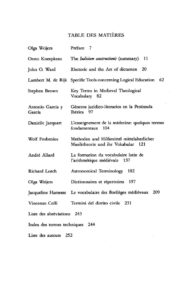
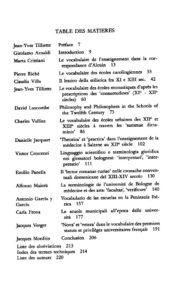
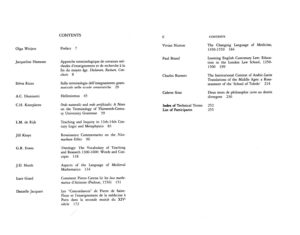
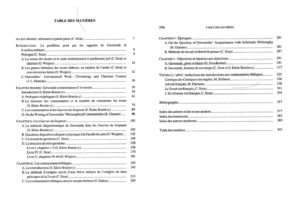
Commentaires récents